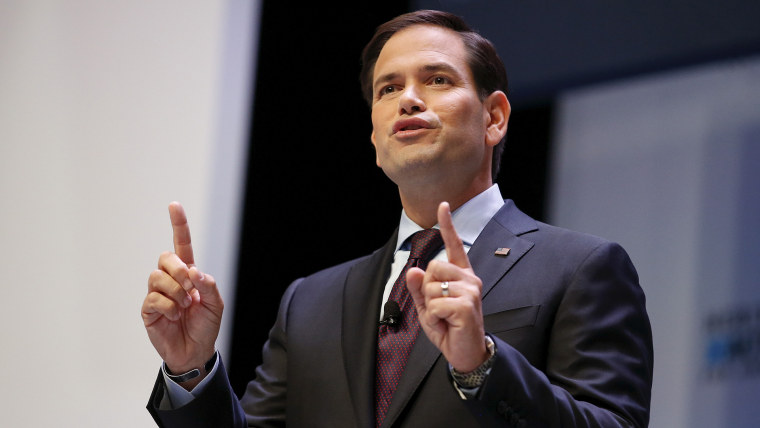In the summer of 2008, John McCain was trailing in the presidential race, but he was still within striking distance of Barack Obama. Sarah Palin had not yet been added to the Republican ticket, and the Great Recession had not yet begun in earnest.
There was a question, however, that the GOP nominee and his allies struggled to answer: what were the differences between McCain and George W. Bush? Sen. Roy Blunt (R-Mo.) tried to answer, but
couldn't think of a difference.
Neither could Sen. Lindsey Graham (R-S.C.). In July 2008, then-South Carolina Gov. Mark Sanford (R), a man rumored to have been a VP possibility, was asked the same question and
replied, "I mean, for instance, take, you know -- take, for instance, the issue of -- I’m drawing a blank, and I hate it when I do that, particularly on television."
Seven years later, Sen. Marco Rubio (R-Fla.) fielded a similar question from CNBC's John Harwood, who asked the far-right candidate if there's "anything that you disagree with George W. Bush or Mitt Romney on." In this week's interview,
Rubio responded:
"Well, we’re in a different era. For example, my policies are about taking free enterprise and limited government, but applying them to the unique challenges of the 21st century. So you’ll hear me spend a tremendous amount of time talking about higher-education reform. Our higher-education model is outdated. And I proposed concrete bipartisan ideas about how to fix some of those things. "We’re in an era now of increased global competition where America no longer can put in place policies because we think ideologically it’s a good or bad idea. The fundamental question is does it make us competitive again. And on many of those issues, I’ve offered solutions and ideas that no Republican’s ever talked about before because they were not part of the 20th century debate."
The answer certainly includes more words than what Sanford offered in 2008 to highlight the differences between McCain and Bush, but note, Rubio couldn't think of any examples, either. The Floridian believes he's in "a different era," which is true, but that simply means time has elapsed -- it isn't evidence of a different policy agenda.
Rubio supports "free enterprise," like every other modern Republican president and candidate. He's focused on "limited government," which is familiar, too. Rubio has a far-right higher-education plan, which includes familiar provisions we've seen from others (the issue was a staple of Romney's 2008 platform).
Rubio's pitch, in effect, seems to be, "You can tell I'm a candidate focused on the future because I use words like 'future' and '21st century' a lot."
But there's no reason for anyone to take this at all seriously.
New York's Jon Chait
explained:
Rubio’s promises to deregulate Wall Street and the fossil-fuel industry, enact a massively regressive tax cut, and repeal Obamacare, are standard issue -- one might even say cookie-cutter -- Republican proposals. [...] What’s stranger is Rubio’s claim that his issues -- actually, issue, singular -- is completely novel to anything considered by Bush or Romney because “they were not part of the 20th century debate.” The gambit here is to wall off any association between Rubio and previous Republican failures by drawing a line at the century mark, after which all intellectual continuities stop. The trouble with this little trick is that the Bush administration took place from 2001 to 2009. Romney ran for president in 2008 and 2012. All these things took place during the 21st century.
It raises the inconvenient question of whether Rubio understands exactly when the 21st century began.
Slate's Jamelle Bouie
added late yesterday that Rubio is "running for another Bush term," adding the senator is a "George W. Bush Republican in every conventional sense."
It's quite possible that for many in the Republican base, this isn't a deal-breaker -- many in the GOP still have fond impressions of the Bush/Cheney era. But the observation is true either way.
